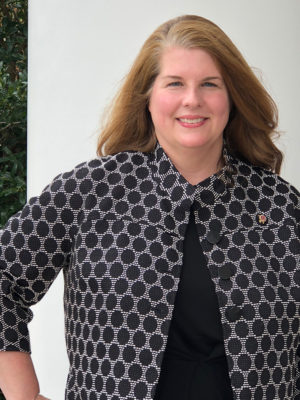How The Executive Board Keeps Policy Governance Implementation In Check
by Susan Bonifield, Nu Beta (U of Mississippi), International Vice President of Finance

Around this time of year, who hasn’t been reminded the importance of checking a list? Well, that’s exactly what the Executive Board does when we perform monitoring as part of our policy governance work.
As previous articles have outlined, there are three key responsibilities for board members under the Carver method of Policy Governance: creating policy, monitoring and membership connection. The monitoring process is data driven and designed to provide a structured way for our Executive Director to share the work of the Fraternity with our Executive Board. Each Ends policy and Executive Limitations policy has a monitoring report that is prepared by our professional staff team and reviewed by the Executive Board at least once each biennium. This is how we look at where we have been, where we are now, and where we are going.
This concept is also frequently touted as a best practice in management and leadership. The fundamental tenet of monitoring has also been articulated in the common saying “inspect what you expect”. In his blog post, Doug Thorpe shared his thoughts on why monitoring was such a critical part of leadership. In his words, “When a leader sets out a goal or directive, that goal can only be achieved with good monitoring, or inspection.” As an Executive Board, we certainly believe that we have established high expectations in our Ends Policies and Executive Limitations Policies. These are the goals we have set for the future of our Fraternity and for the benefits we hope each member will receive. There is nothing more important to us than achieving those goals. Therefore, we must inspect what we expect and actively monitor our progress.
For policies in the Executive Limitations category, the board reviews data on everything from our financial position to our human resources practices. We receive regular reports on topics including staff and volunteer satisfaction, potential extension opportunities, and industry standard financial metrics like days cash on hand and the overall performance of our investment portfolio. Monitoring our Ends Policies is a bit more complicated given their broad scope; however, we are beginning to see data that is helping us understand where we are with respect to ambition, confidence, belonging and character. In fact, many of our collegiate sisters may remember participating in a survey last spring that was intended to measure these factors in our members as compared to the same factors in members of other sororities and young women not affiliated with a sorority.
In short, we’ve made our list, now we must check it twice to ensure that Alpha Omicron Pi continues to inspire ambition for all of us.
Note: An earlier version of this article included a headline that was insensitive to some readers, and it has been amended. We apologize that the previous language was exclusionary and highlighted a connection to Christmas, which is not a holiday that all members of our organization celebrate or observe. We are committed to recognizing our mistakes and to being inclusive of diverse perspectives in all we do.

